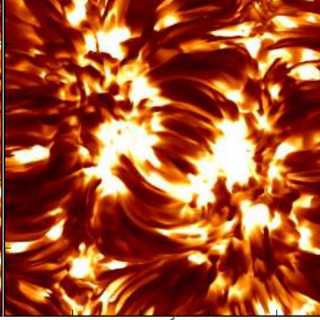Bibcode
del Pino Alemán, T.; Trujillo Bueno, J.; Štěpán, J.; Shchukina, N.
Bibliographical reference
The Astrophysical Journal, Volume 863, Issue 2, article id. 164, 20 pp. (2018).
Advertised on:
8
2018
Journal
Citations
46
Refereed citations
40
Description
One of the key research problems in stellar physics is to decipher the
small-scale magnetic activity of the quiet solar atmosphere. Recent
magneto-convection simulations that account for small-scale dynamo
action have provided three-dimensional (3D) models of the solar
photosphere characterized by a high degree of small-scale magnetic
activity, similar to that found through theoretical interpretation of
the scattering polarization observed in the Sr I 4607 Å line. Here
we present the results of a novel investigation of the Hanle effect in
this resonance line based on 3D radiative transfer calculations in a
high-resolution magneto-convection model having most of the convection
zone magnetized close to the equipartition and a surface mean field
strength < B>≈ 170 G. The Hanle effect produced by the
model’s magnetic field depolarizes the zero-field scattering
polarization signals significantly, to the extent that the
center-to-limb variation (CLV) of the calculated spatially averaged
polarization amplitudes is compatible with the observations. The
standard deviation of the horizontal fluctuations of the calculated
scattering polarization signals is very sensitive to the model’s
magnetic field, and we find that the predicted spatial variations are
sufficiently sizable so as to be able to detect them, especially with
the next generation of solar telescopes. We find that at all on-disk
positions, the theoretical scattering polarization signals are
anticorrelated with the continuum intensity. To facilitate reaching new
observational breakthroughs, we show how the theoretically predicted
polarization signals and spatial variations are modified when
deteriorating the signal-to-noise ratio and the spectral and spatial
resolutions of the simulated observations.
Related projects

Magnetism, Polarization and Radiative Transfer in Astrophysics
Magnetic fields pervade all astrophysical plasmas and govern most of the variability in the Universe at intermediate time scales. They are present in stars across the whole Hertzsprung-Russell diagram, in galaxies, and even perhaps in the intergalactic medium. Polarized light provides the most reliable source of information at our disposal for the
Tanausú del
Pino Alemán